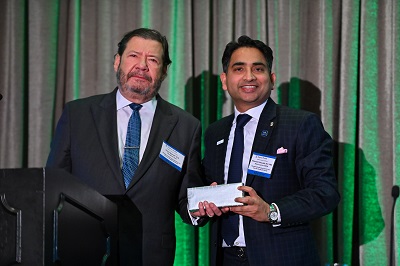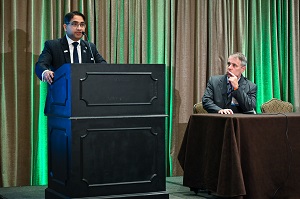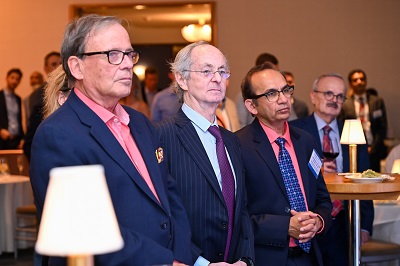(l-r) Dr. L. Dade Lunsford, Dr. Juan Arturo Fridman, and Dr. Ajay Niranjan
By Adrienne Sylver
Advances in radiosurgery are making it possible for more patients with benign and metastatic brain tumors, vascular malformations and functional brain disorders to receive lifesaving and life-prolonging less invasive treatments. To discuss this rapidly evolving field and review the newest outcomes data, Baptist Health Miami Cancer Institute recently partnered with the International Radiosurgery Research Foundation (IRRF) to host the International Radiosurgery Research and Education Meeting in Coconut Grove.

Dr. Gene Barnett and Dr. Manmeet Ahluwalia
“The summit brought together renowned international thought leaders sharing their expertise on stereotactic radiosurgery, science-backed strategies for treating benign and metastatic brain tumors and emerging trends with radiosurgery innovations,” said Manmeet Ahluwalia, M.D., MBA, FASCO, meeting director and deputy director, Fernandez Family Foundation Endowed Chair in Cancer Research, chief of medical oncology and chief scientific officer of Miami Cancer Institute. “The meeting highlighted the need for multidisciplinary collaboration to drive further research and innovation.”

Dr. L. Dade Lunsford
At the conference, Dr. Ahluwalia was joined by speakers from Cleveland Clinic, the University of Pittsburgh Medical Center, Mayo Clinic, New York University, Ruber International Hospital in Madrid, Yale University, Cornell University, the Ohio State University and Taipei Veterans General Hospital in Taiwan along with radiation oncologists, neurosurgeons and physicists from other top-ranked cancer centers.
Founded in 2008, the IRRF unites academic and clinical centers of excellence that use stereotactic radiosurgery devices. The group facilitates clinical trials and assists researchers with pooling data to help evaluate and improve outcomes ― something that can be difficult to do when individual centers may only see small numbers of patients with these relatively rare conditions.
Radiosurgery plays a pivotal role in the treatment of brain tumors, harnessing high-energy radiation to precisely target and destroy abnormal tissue while reducing damage to healthy brain tissue. Stereotactic radiosurgery (SRS), stereotactic body radiation therapy (SBRT) and ablative radiotherapy (SABR), along with complementary therapies such as laser interstitial thermal therapy (LITT) and focused ultrasound (FUS) were among the meeting topics.
Physician-researchers also discussed:
- Combining immunotherapy and SRS
- Radiomics
- The application of artificial intelligence in radiosurgery
- Pre-operative and post-operative SRS
- Medical and surgical management of radiation necrosis
- Management of recurrent brain metastases
Keynote speaker L. Dade Lunsford, M.D., distinguished professor of neurological surgery at the University of Pittsburgh Medical Center spoke on “The Meningioma Project.” Keynote speaker Gene Barnett, M.D., director of the Burkhardt Brain Tumor and Neuro-Oncology Center at Cleveland Clinic spoke on “Radiosurgery in the Time of a Pandemic.”

Dr. Manmeet Ahluwalia and Dr. Jason Sheehan
With innovations driving device and drug development and a focus on expanding the use of minimally invasive procedures, Miami Cancer Institute is able to offer alternatives to surgery for more patients. A number of the clinical trials offered at the Institute involve treatment for brain cancer.
“It was particularly gratifying to see the progress made in brain metastases in the last decade or two, from an average survival of six to nine months to an average survival today of two to three years. As clinical trials and science continue to advance, the future of cancer care holds promise and better outcomes for patients. Sharing our knowledge and working collaboratively is helping us gain traction on this devastating illness,” Dr. Ahluwalia said.
Other Baptist Health physicians on the meeting faculty were radiation oncologist Rupesh Kotecha, M.D., chief of radiosurgery and director of the Central Nervous System Metastasis Program at Miami Cancer Institute, and Alonso N. Gutierrez, Ph.D., MBA, the chief of medical physics at Miami Cancer Institute.



























